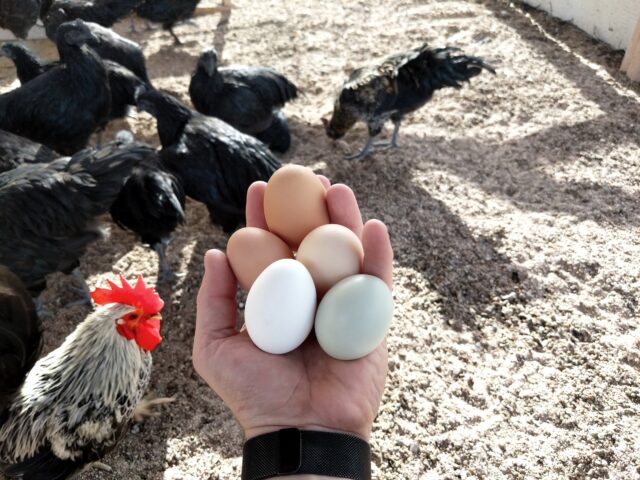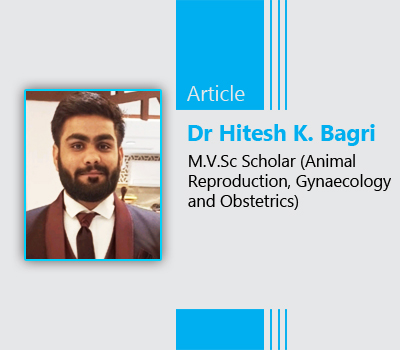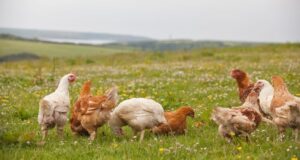
Introduction:
Various types of poultry disease seriously affect meat and egg production. There are various reasons for the diseases are poor sanitation, management, etc. Most of the diseases are identified by general or usual physical conditions. For safe poultry farming, you need to keep safe from all types of diseases.
The following managerial factors help to reduce the spread of disease in poultry farm:-
1. Isolation
- It is not advisable to rear birds of different age groups in the same house. Wherever possible, it is advisable to practice the all-in-all-out system.
- Proper layout of houses, appropriate design to prevent any entry of rodents, proper ventilation, and the designing of feeders and drinkers to avoid spillage, are essentials in disease prevention.
2. Litter management
- Wet litter is a potential source of disease transmission. Maintain proper litter conditions as suggested earlier.
3. Quality chicks
- Ensure that chicks are received from a hatchery where adequate preventive care is taken for breeder birds to guard against mycoplasmosis, salmonellosis, and infectious bursal disease.
- Check for a history of vaccination against Marek’s disease. Look for signs of dehydration.
- Ensure that the received chicks are healthy and are within the normal weight range.
4. Proper nutrition
- A well-balanced feed prepared according to nutrient requirements at different ages will ensure proper health and good immune status in birds; the addition of coccidiostats and vitamin and mineral supplements are essential.
5. Litter removal
- After the pen is emptied, deep litter and caged layer droppings should be removed to a field far from the poultry shed, and spread to dry in the sun. It should be disposed off as soon as possible for manure or other purposes and not allowed to remain to accumulate for a long period. Composting is better since the heat produced will destroy the pathogens.
6. Disinfection
- Disinfection is the process or act of destroying pathogenic microorganisms.
- A disinfectant is an agent that destroys pathogenic organisms, and that can be applied to inanimate objects or used as a footbath. Phenol, cresol, chlorine compounds, and iodophors can be used for disinfecting surfaces as well as the egg room, feeders, drinkers, buildings, and footwear; liquid formalin at a 5% level, or formaldehyde gas by fumigation, will also serve as an effective disinfectant.
- Sun-drying may be practiced for washed equipment; for cement surfaces-dry heat in the form of flame is recommended. Copper sulfate as a 0.5% solution is effective against fungi.
- Quaternary ammonium compounds are good disinfectants when used according to directions. However, they are not effective in hard water. They can be used for disinfecting surfaces, washing egg rooms, feeders and drinkers, and other equipment.
7. Rodent control
- Keep rodents out from the initial stage of farming itself, since once the farm is infested, it is difficult to get rid of them. Remove piles of unused equipment and empty gunny bags as they serve as breeding places for rats, mice and squirrels also remove spilled feed daily. Store feed in well-ventilated, rodent-proof rooms.
- Use traps in the initial stages and later rodenticides. Rodenticides should be used at night according to specifications.
8. Insect control
- Countermeasures against insects are part of maintaining a sanitary environment, as insects play a significant role in transmitting disease-producing micro-organisms, tapeworms, etc.
- Flies sit on the birds, irritate them, and prevent them from taking water and feeding normally, causing stress which results in reduced egg production, especially where cage rearing is practiced.
- Insect or fly control measures include:
- Avoiding stagnation of water in and around the farm premises. Provision of proper drainage facilities, attending immediately to leaky drinkers, water lines, etc.
- Use insecticide sprays or dusting at required intervals, treat the birds and check the feed and water quality to avoid watery droppings. Keep the surroundings clean by covering the area with treated soil devoid of vegetation or by growing grass lawns.
9. Water quality
- Poultry farmers often fail to provide the birds with good quality water.
- Both the microbial and chemical quality of the water needs to be tested before establishing a poultry farm in a given area.
- Microbial contamination of water may happen at the source, for instance in ponds, rivers, open wells, and the public water supply system, or during transportation and storage, as well as in the overhead tank or bins. Unhygienic practices on the farm result in the spread of disease.
- The microbial load shoots up during flood conditions. The fecal contamination of water will add to the presence of coliform organisms.
- Mineral levels in water depend on soil conditions and show only minor fluctuations based on the season and the water table. They lead to hardness in water and affect taste and palatability.
- Ionophores (1.6% available iodine) are also used as water sanitizers at the same dosage level. Products containing Quarternary ammonium compounds like quat, quatovet, encivet, sokrena, etc. may be used as water sanitizers as per the manufacturers’ specifications. By providing sanitized water to the birds, the chance of water-borne infections is reduced and the cost of medication is saved. The life of pipelines and storage tanks is also increased, and the overall growth of the birds and egg production efficiency will be improved.

Hitesh K. Bagri1*, Nadeem Shah2, Anusmita Baishya3, Manisha Sethi4, Manoj Sharma5, Inzamul Alam5, Mir M. Rafiq5
1MVSc Scholar (Animal Reproduction, Gynaecology and Obstetrics)
2PhD Scholar (Animal Reproduction, Gynaecology and Obstetrics)
3PhD Scholar (Livestock Production and Management)
4Lecturer, Kullu Institute of Veterinary Pharmacist
5MVSc Scholar (Livestock Production and Management)
















